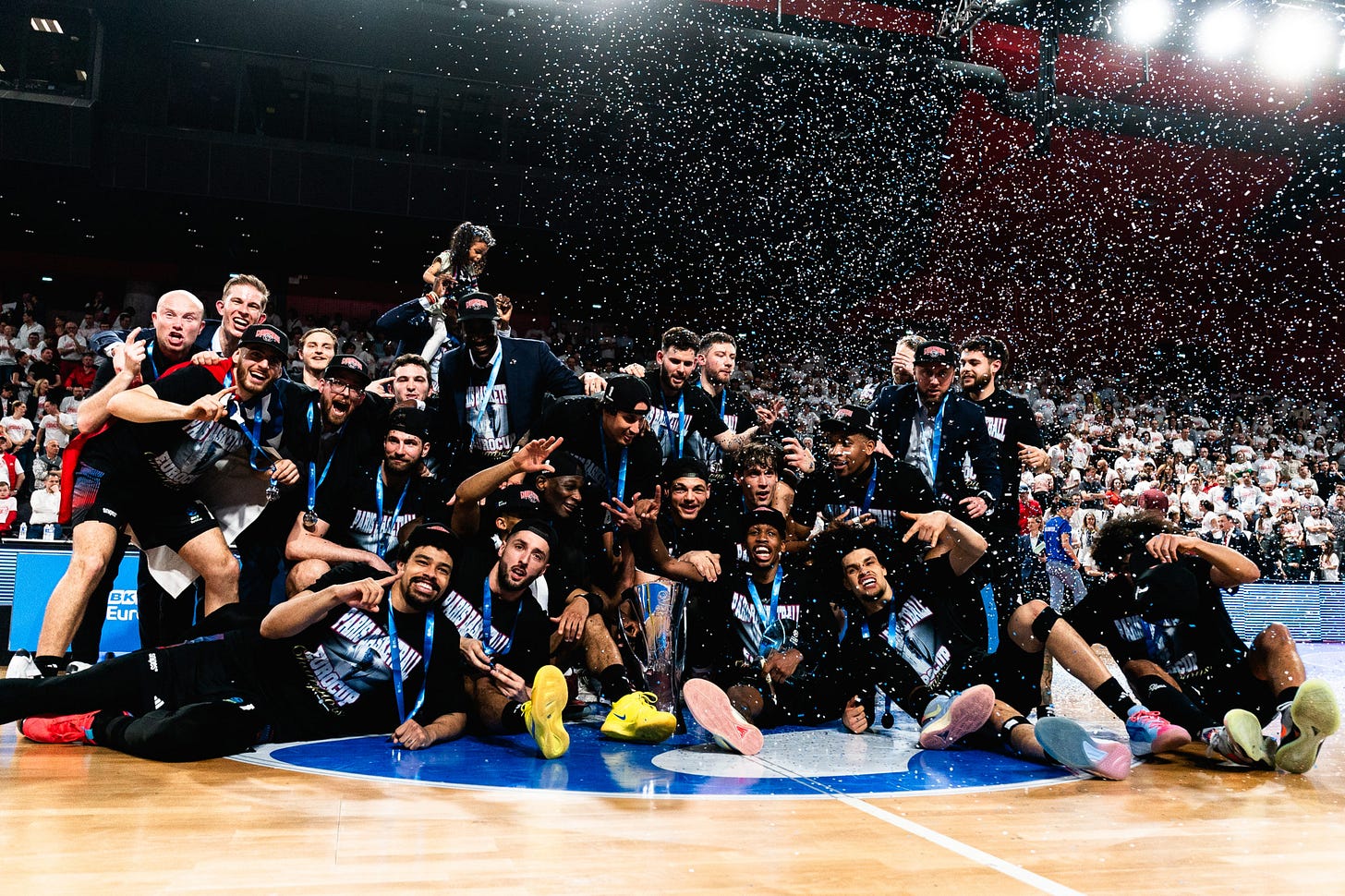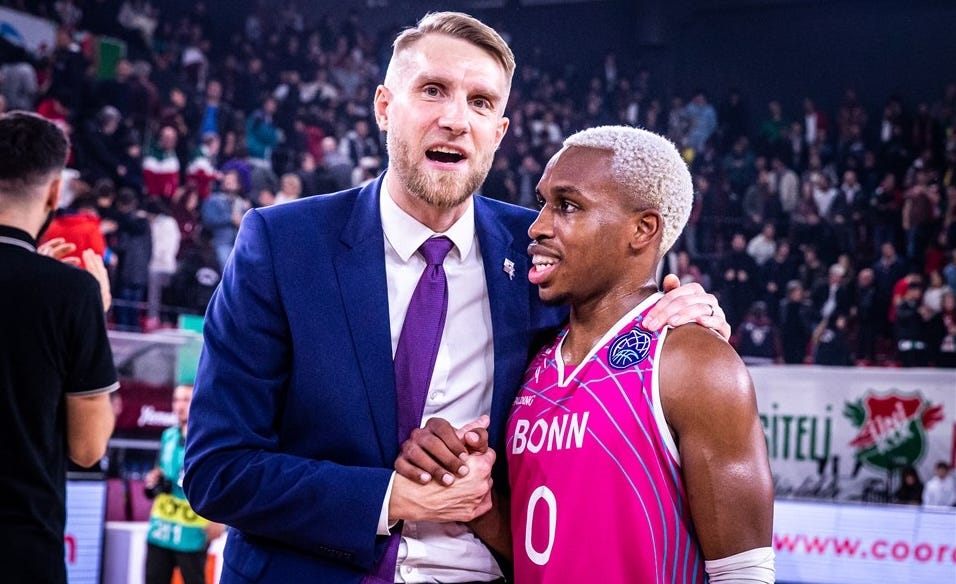Paris Basketball Uncovered
Paris has been the most intriguing team for couple of months around Europe without any doubts. Tiago Splitter and his squad put up the 10 games winning streak in the EuroLeague as a newcomer of the competition. How the club that established in 2017 reached this kind of progression in really short time and how they build a team characteristics that have been dominating the biggest stage of Europe?
The Budget Illusion of Success
The biggest investments in club’s history have started on 2023 summer with coming of coach Tuomas Iisalo who led Bonn to claim FIBA BCL Championship 2 months ago. Furthermore, 2022-23 Bonn has an important role in this story because it became the bases for new Paris Basketball. Coach Iisalo was not the only person arrived to Paris from Bonn; also Kratzer, Shorts, Ward, Malcolm, Kessens and Herrera were the players who came from. So, Tuomas Iisalo not only brought 6 players within his suitcase, and also a brought a team spirit which was formed in Bonn and which they’re really going to need it. 2023 summer was literally “rebuild” for Paris, all players have gone except the local players Gauthier Denis and Mohamed Diawara.
2nd tier league in European basketball, EuroCup, hosts some clubs that invests on high standards every season like Gran Canaria, Hapoel Tel-Aviv or ratiopharm Ulm. The French team joined the league with a payroll of €2.8 million, including the 10% taxes applied in France. According to BasketNews and Eurohoops, Besiktas, which reached the semifinals, had a payroll of €4.8 million, Ulm approximately €3 million, and Gran Canaria, eliminated in the Eightfinals, participated with the payroll around €4.5 million. Additionally, Paris eliminated London Lions which had one of the top budgets in the competition and pays around €750k to only Sam Dekker. Long story short, money wasn’t the key to Paris’ success. Paris was not participating with the biggest budget but probably with the smartest investment.
What they've accomplished this season feels even more far-fetched. After became the EuroCup champions, there were some rumors about Paris’ financial conditions were not able to participate to the EuroLeague but then they managed to set up a budget more than €7 million which is minimum EuroLeague criteria. It’s €18.8 million total and €5.6 million payroll ,released by LNB, which is double of the last season. That means, Paris’ payroll which includes salaries of players and coaching staff is equivalent to the total salaries of Sasha Vezenkov and Evan Fournier from Olympiacos that they defeated last week. Therefore, we can’t explain these results of Paris with budgets or ‘star’ basketball players.
Iisalo’s Plan and Paris’ Team Characteristics
I think Iisalo was complete genius without any exaggeration. We all know European basketball is way intense and more wide tactical wise and Iisalo brought a new approach to here, far from being old-school.
Paris was the best scoring team by far whole EuroCup season, put up 10 games of scoring 100 and more points. However, they were not a high paced team and even they were not the top-5 on the pace ratings. So, how they recorded outstanding average of 97 points per game in 23 games? From my standpoint it’s due to their both high offensive accuracy and volume. Paris managed to offense with high percentages and attempts, while committing fewer turnovers, which enabled them to score more points than other teams in the league with fewer possessions. That means, “productivity” was key for their scoring upside and Paris’ had a great material on their backcourt rotation for creativity on the offensive end.
TJ Shorts and Nadir Hifi were the two major creative ball-handlers of Paris and the rotation formed with more stretch frontcourt players like Mikael Jantunen and Bandja Sy. Iisalo’s team used that creativity on 21% of their possessions from the PnR Handlers. Additionally, high transition rates (14.3 per game) and fewer post up (3.6 per game) plays led to increase their scoring volume. Moreover if we look up to who plays most post ups, Tyson Ward and Collin Malcolm ,who stands under 6-foot-5, led Paris’ low post plays which means Paris mostly playing post ups against mismatches.
Tuomas Iisalo’s plan led to a successful season for Paris, claimed both EuroCup and French Cup championship. In that case, It wasn't a surprise that Tuomas Iisalo attracted the NBA. He was operating best closest basketball to the NBA and they’ve must noticed that. Tuomas Iisalo made his way to the Memphis Grizzlies as a lead assistant coach. After all, Paris’ front-office kept this philosophy, didn’t sit the table with an old-school European coach and signed with Tiago Splitter. It seems like a good replacement cause Tiago Splitter was serving as a assistant coach in NBA for 5 years.
It would be exciting to watch Tiago Splitter’s first head coaching experience and to see what he will do with Paris. In the summer of 2024, Leopold Cavaliere and Kevarius Hayes are two versatile bigs joined the team and Maodo Lo was addition to Paris’ on-ball creativity on the backcourt rotation. Coach Splitter sticked with the plan but with some adjustments for the EuroLeague level.
The continuity of Iisalo’s basketball, Splitter kept high paced game with transitions and stretching the half-court as much as possible. Guards has freedom and the game is open to surprises. While watching Paris, you can see bunch of early shots and the game includes less complication actually opposed to general approach in European basketball. Only one screen is enough to take a shot or penetrate and dish out to the right corner for Tyson Ward’s three pointer or Mikael Jantunen’s PnP threes. It seem that it’s not a big deal for missing one shot cause they always have the second chance. As I see it, the bigger point is on the creativity side because this game really needs a on-ball operator who decides on the court. Well, everyone knows who is that guy…
TJ Shorts Is Something Else
A standing at 5-foot-9 point guard, how he can be impactful as a TJ Shorts? The being unpredictable mostly explains how he can go anywhere on the court and beat his defender quickly. Shorts’ quick first step, effectiveness on crossovers and hesitations, ball-handling skills leading him to be a killer penetrator. Also he uses his body well, sneaks into tight places, can finish lay-ups in tight places around the rim and doing it well-balanced. In that way, he can turn it for his advantage in the chaos moments on the offensive end. Considering this, It’s way easy to understand why TJ Shorts takes less 3-pointer shots than other ball-handlers in the competition, because he can use every spot of the court effectively. He has many tricks in his pocket which makes him a dangerous finisher inside of the perimeter despite his height: weak hand lay-ups, switching hand lay-ups, one step lay-ups, floaters, mid-range jumpers, finishings with both hands… I mean, he becomes unstoppable if you let him go inside cause he breaks the defense and gets be able to dish out when help defense comes.
TJ Shorts has been operating 41% of Paris’ PnR’s only by himself this season and that number was 50% last season. So, doesn’t need to explain TJ Shorts’ importance for French team. Shorts earns around €550k per year and just like I mentioned in the first chapter, money is just an illusion when we talk about Paris today.









